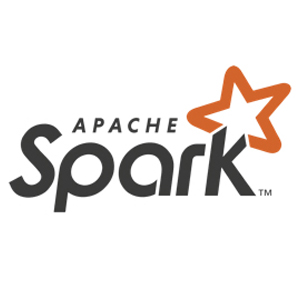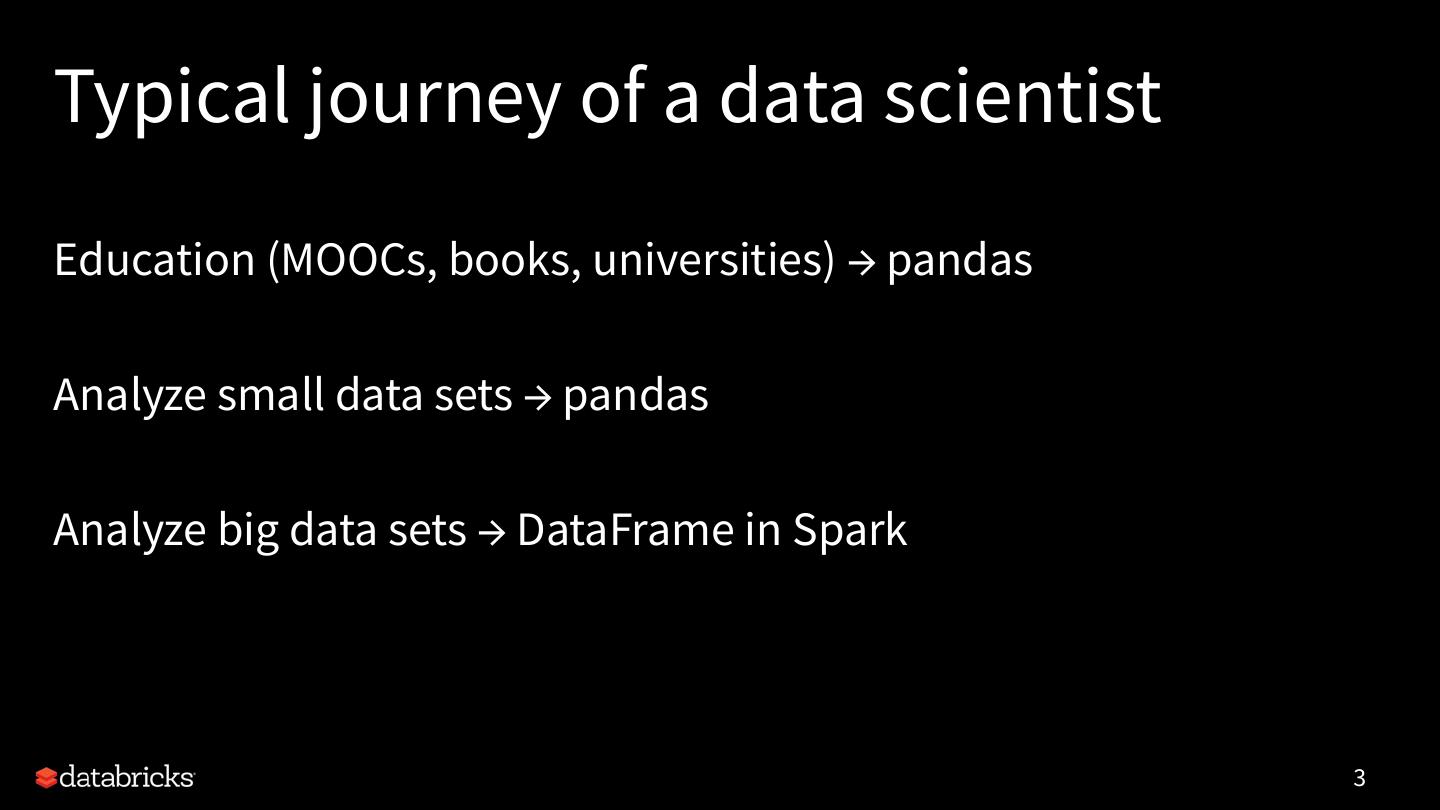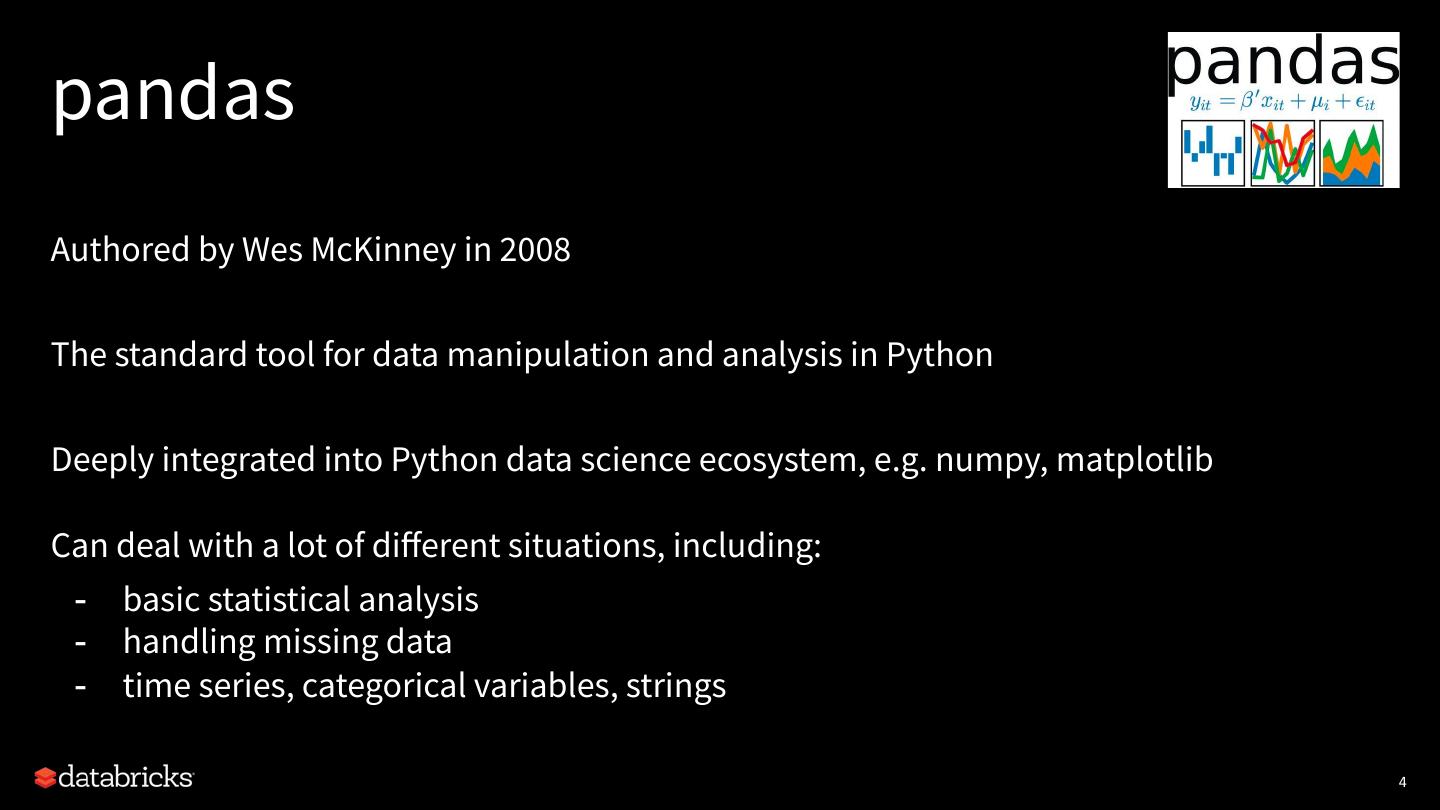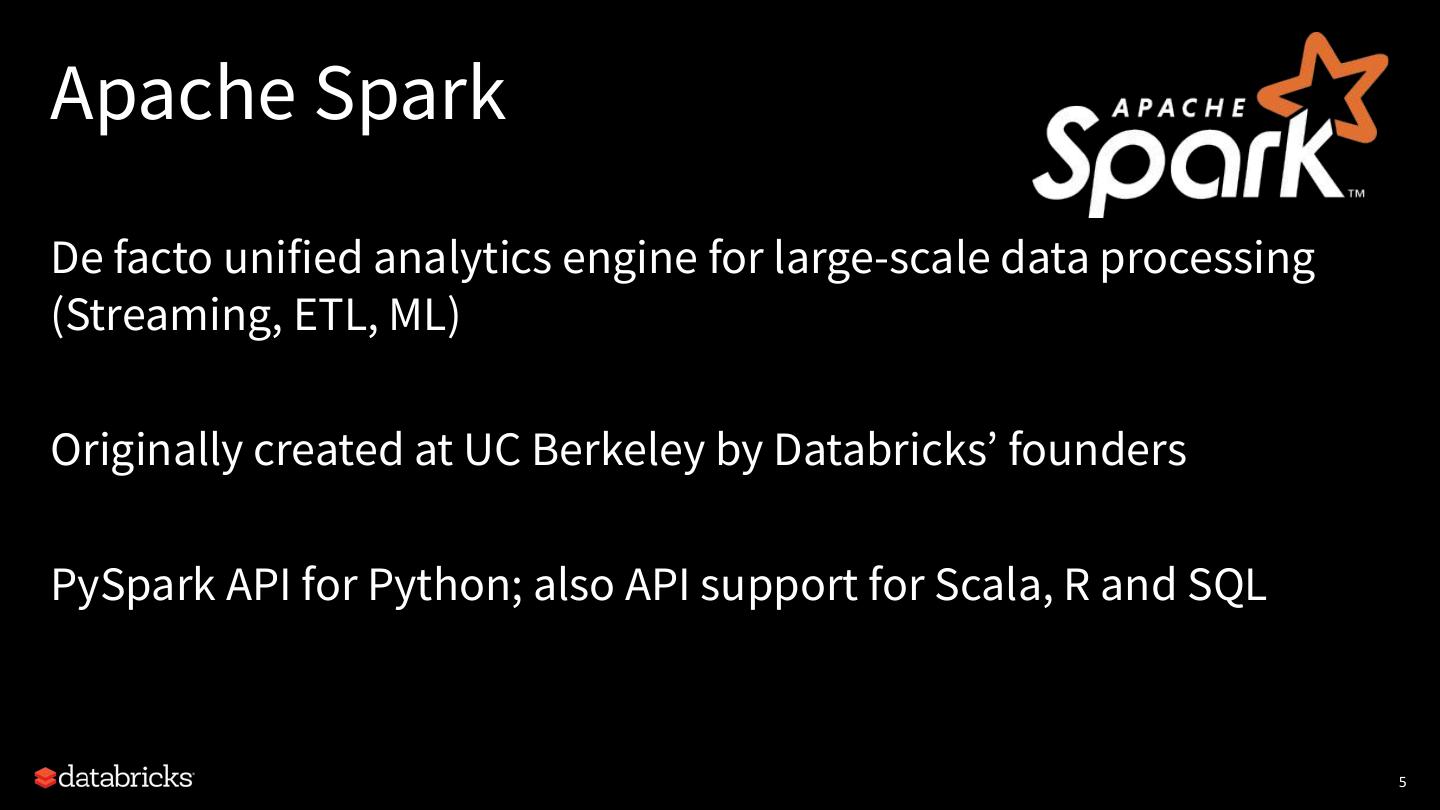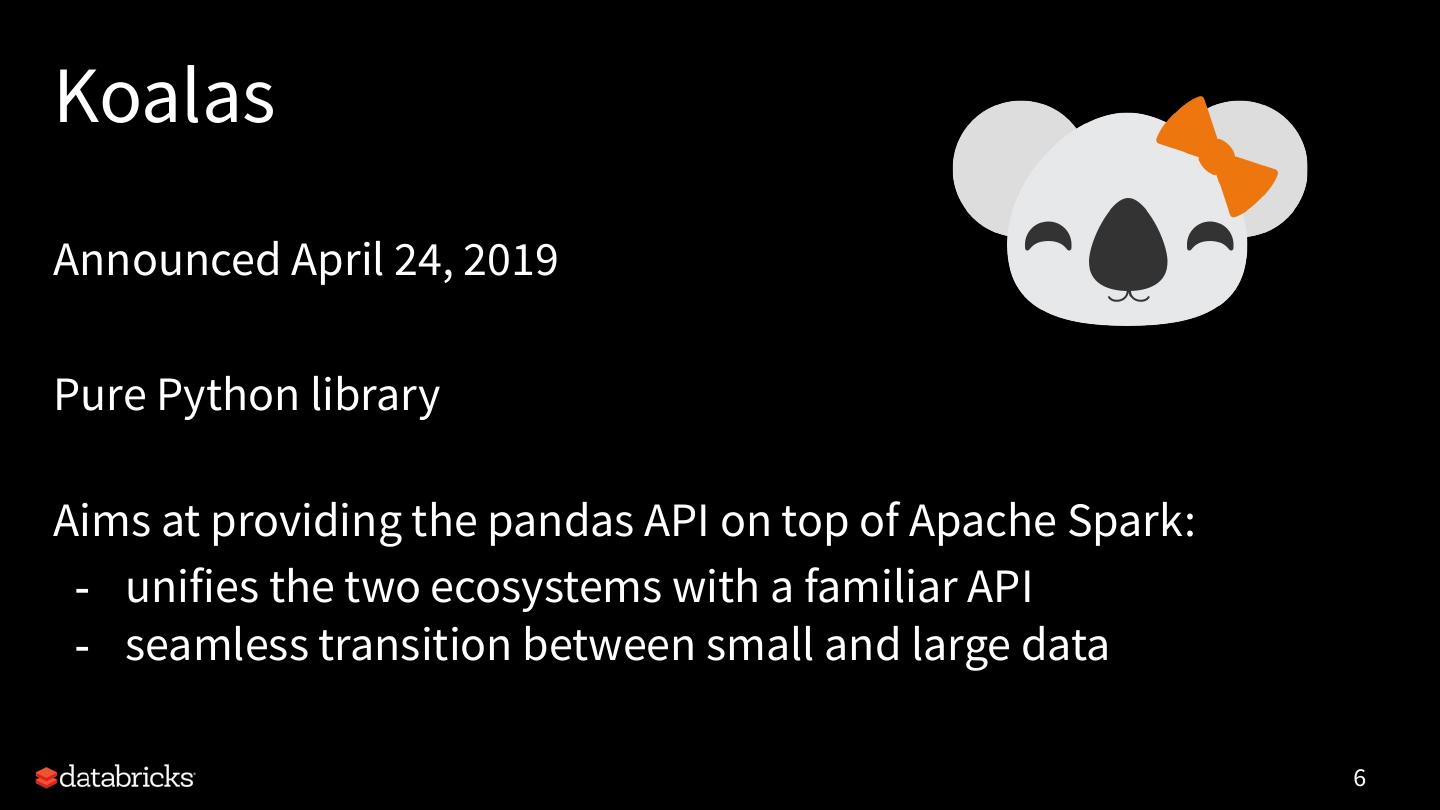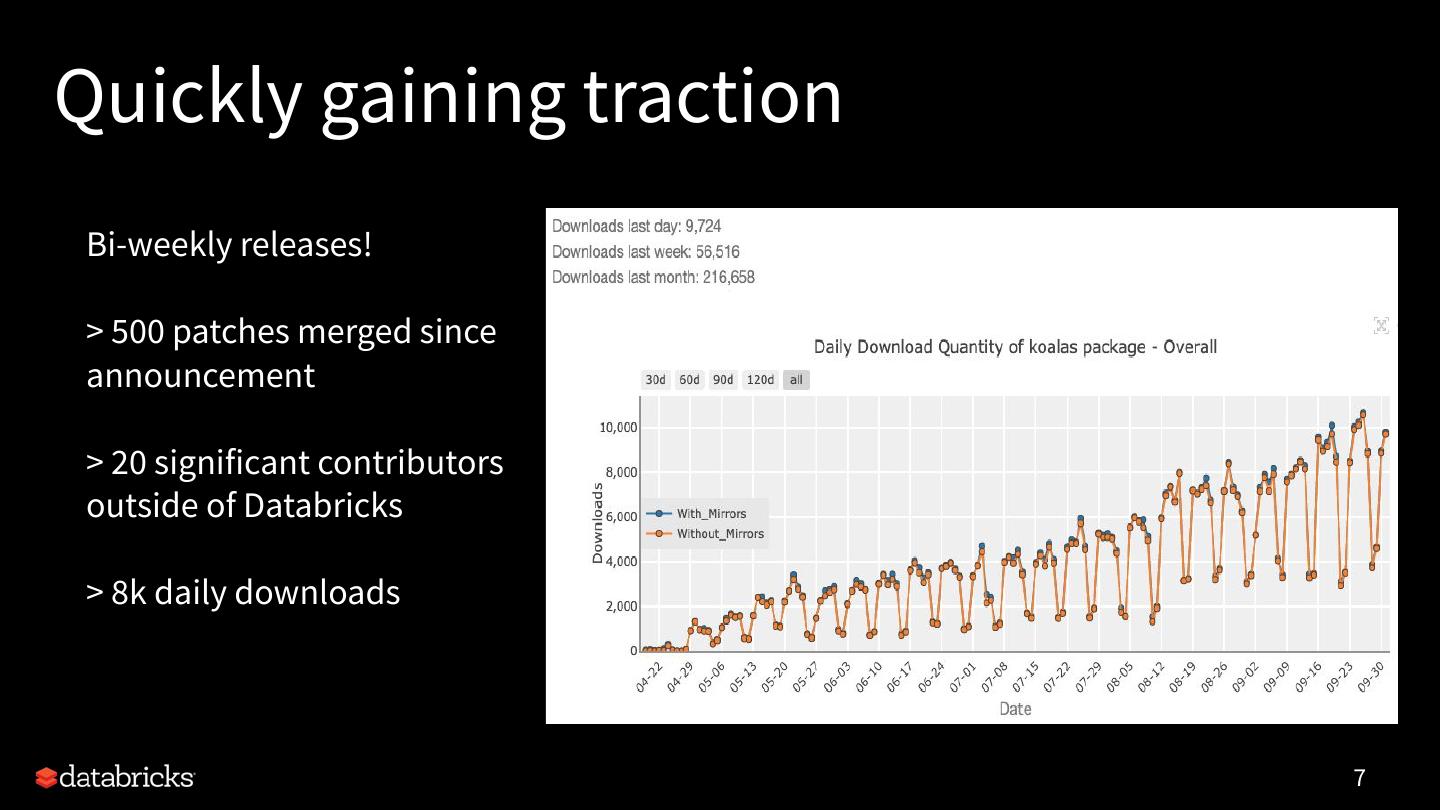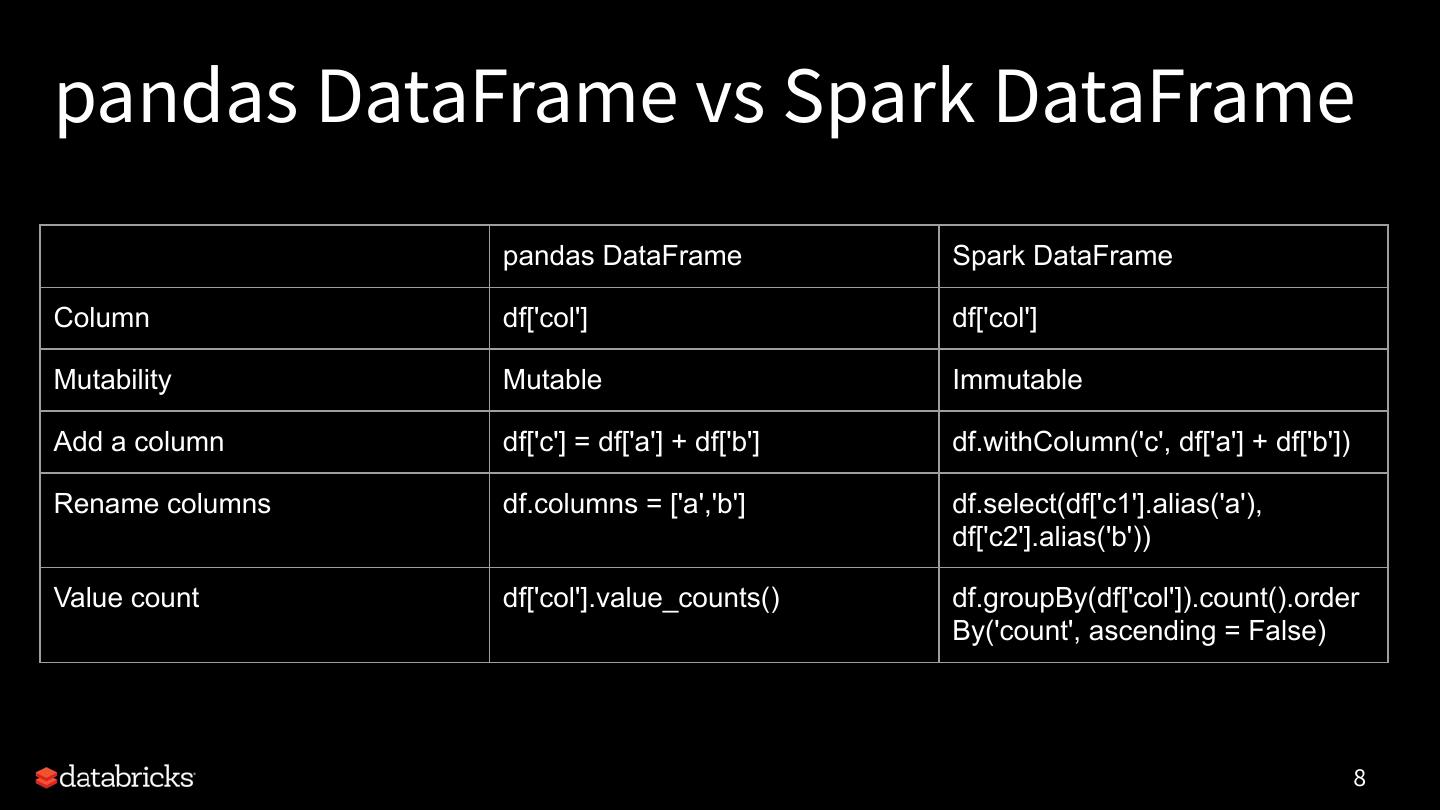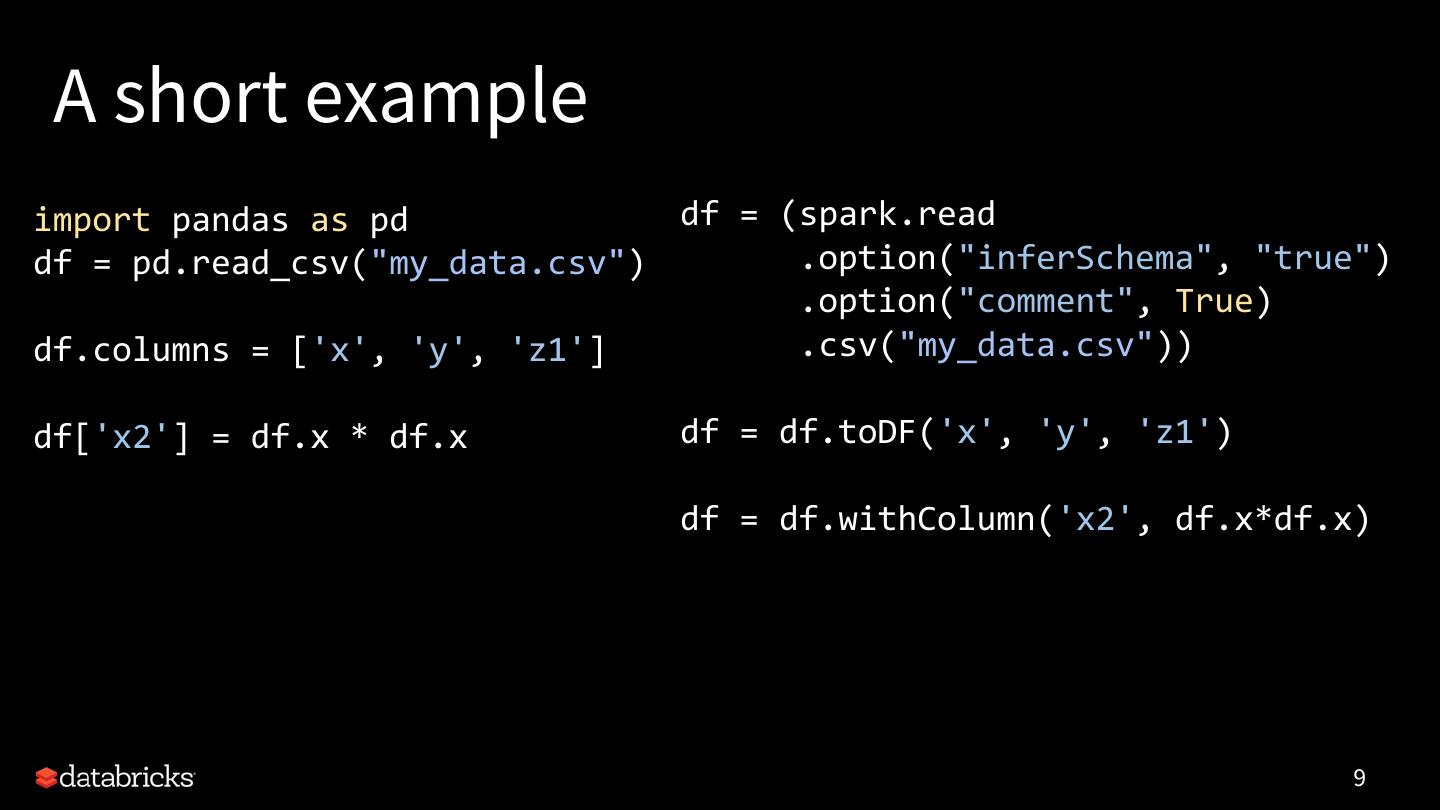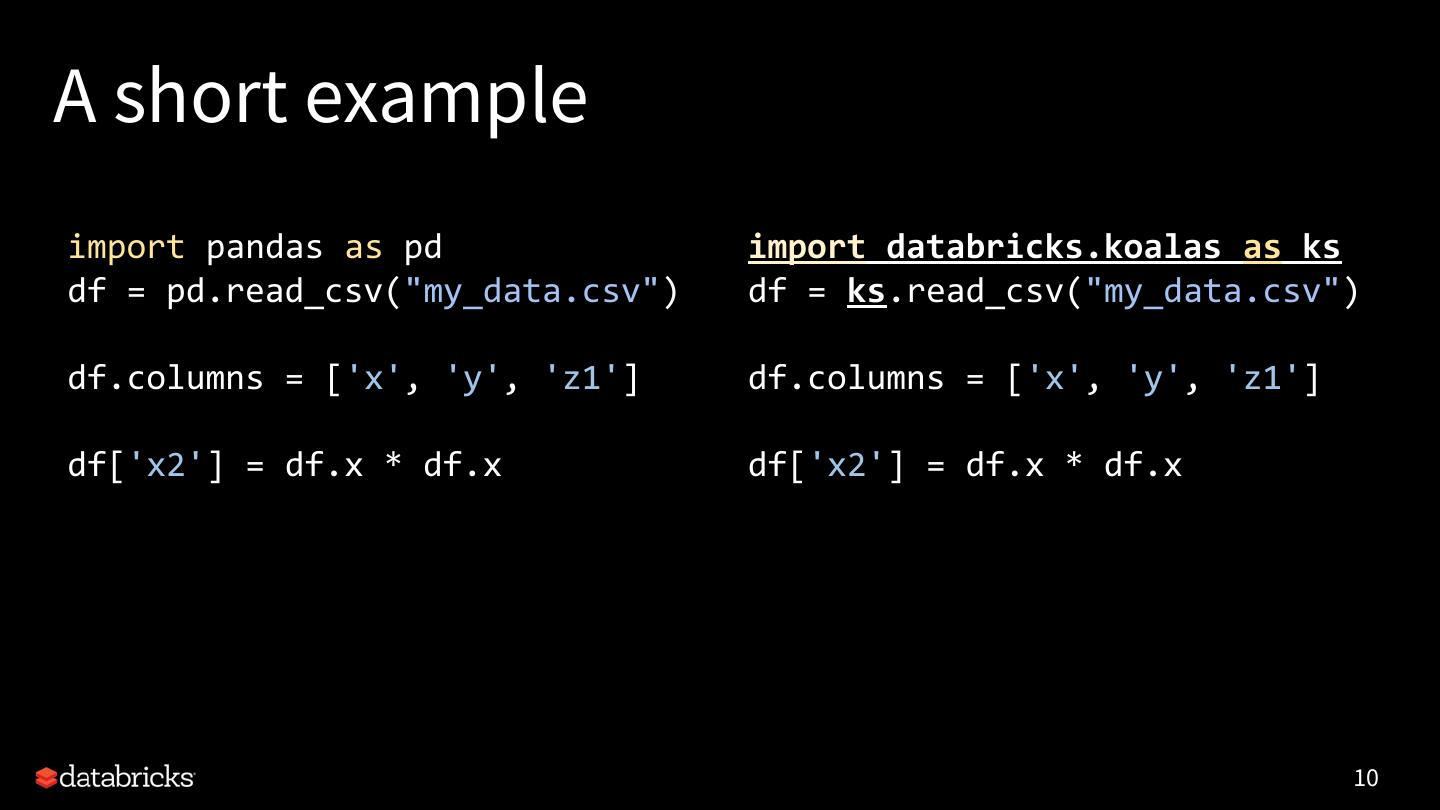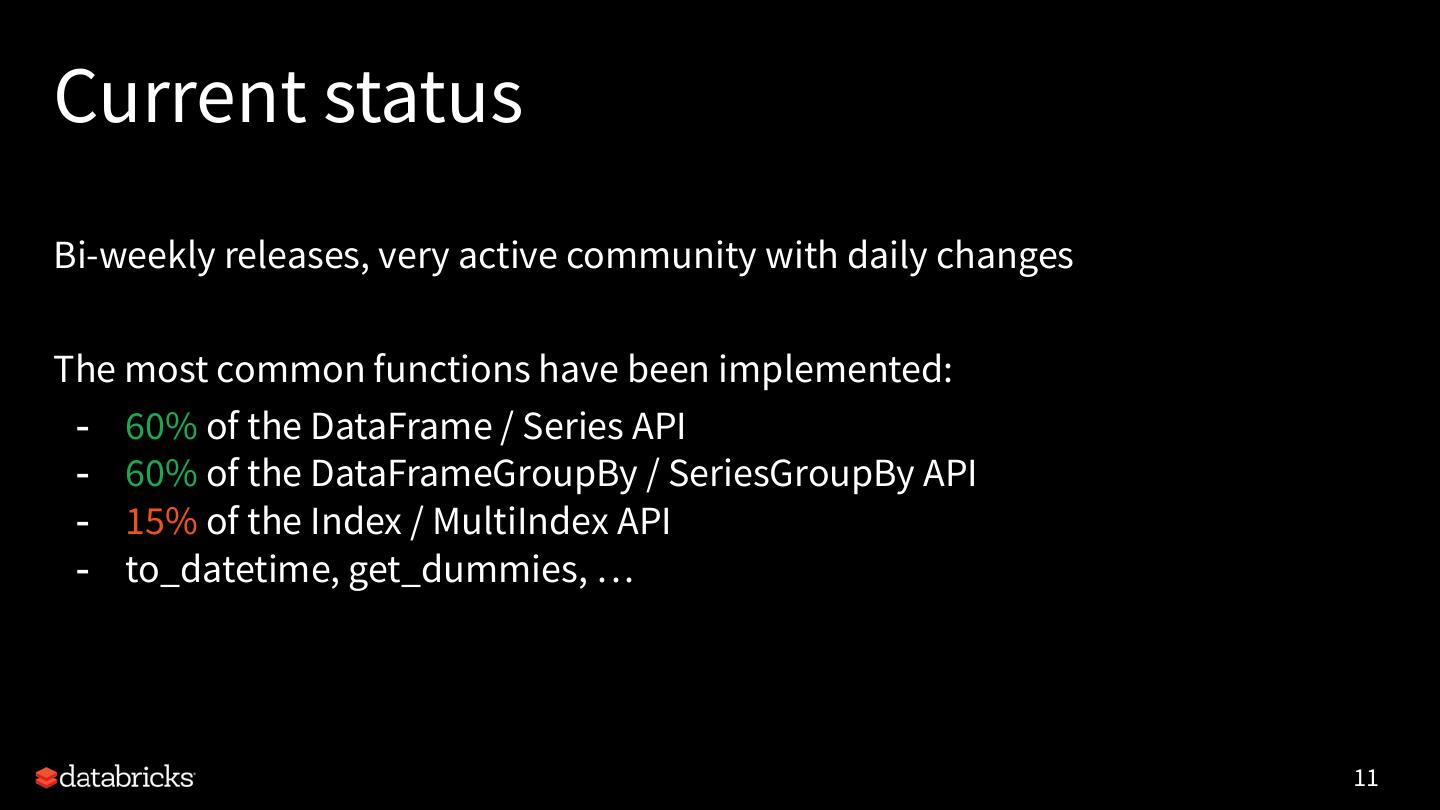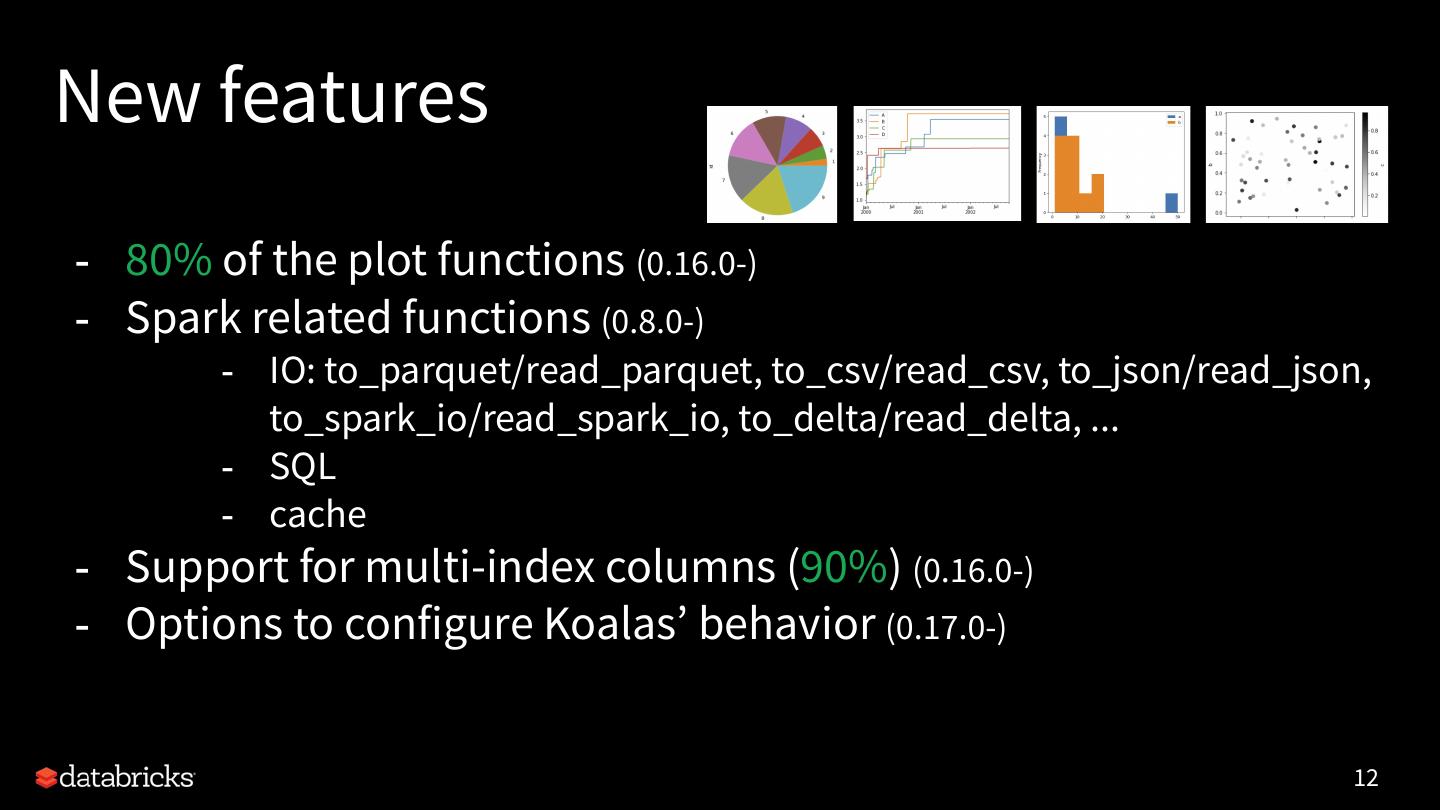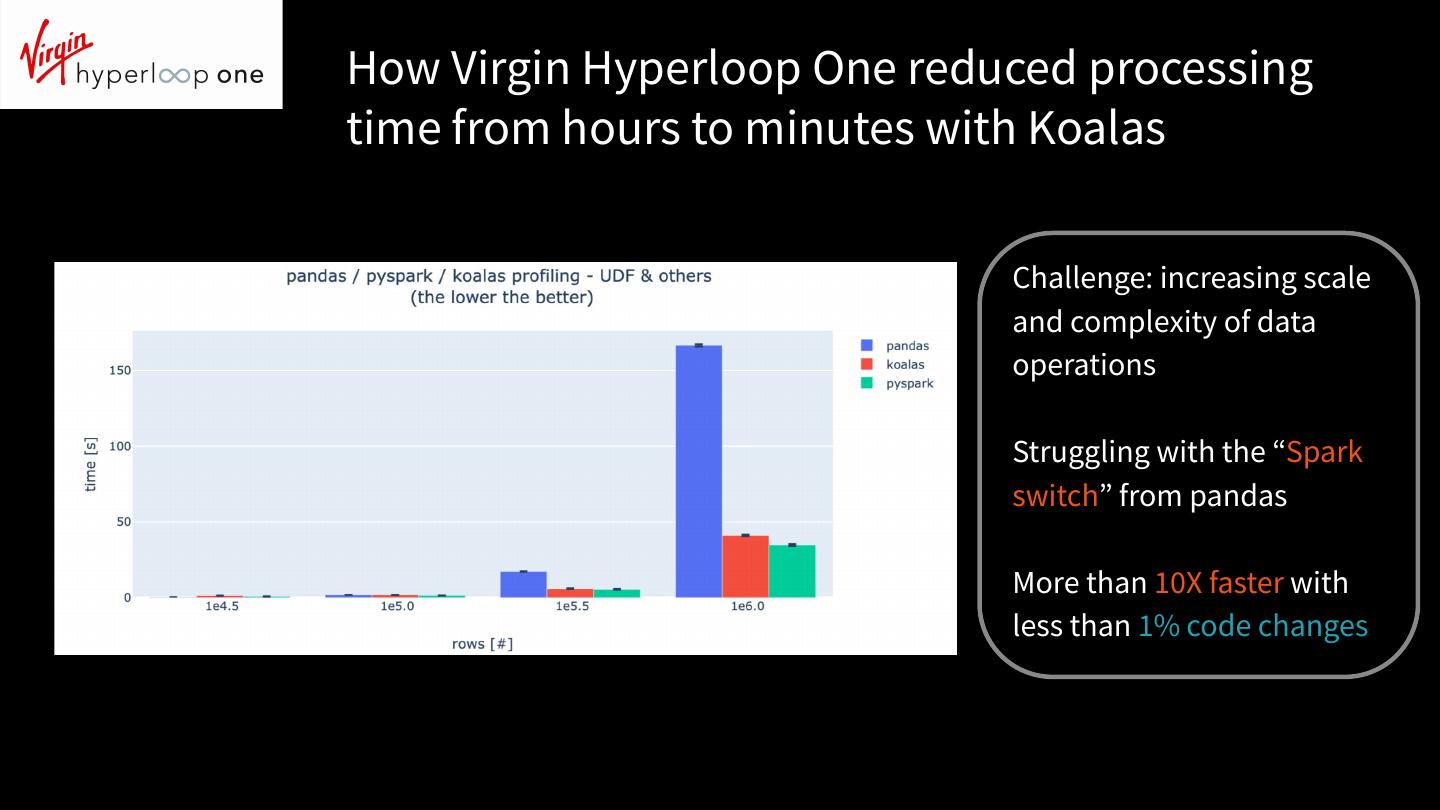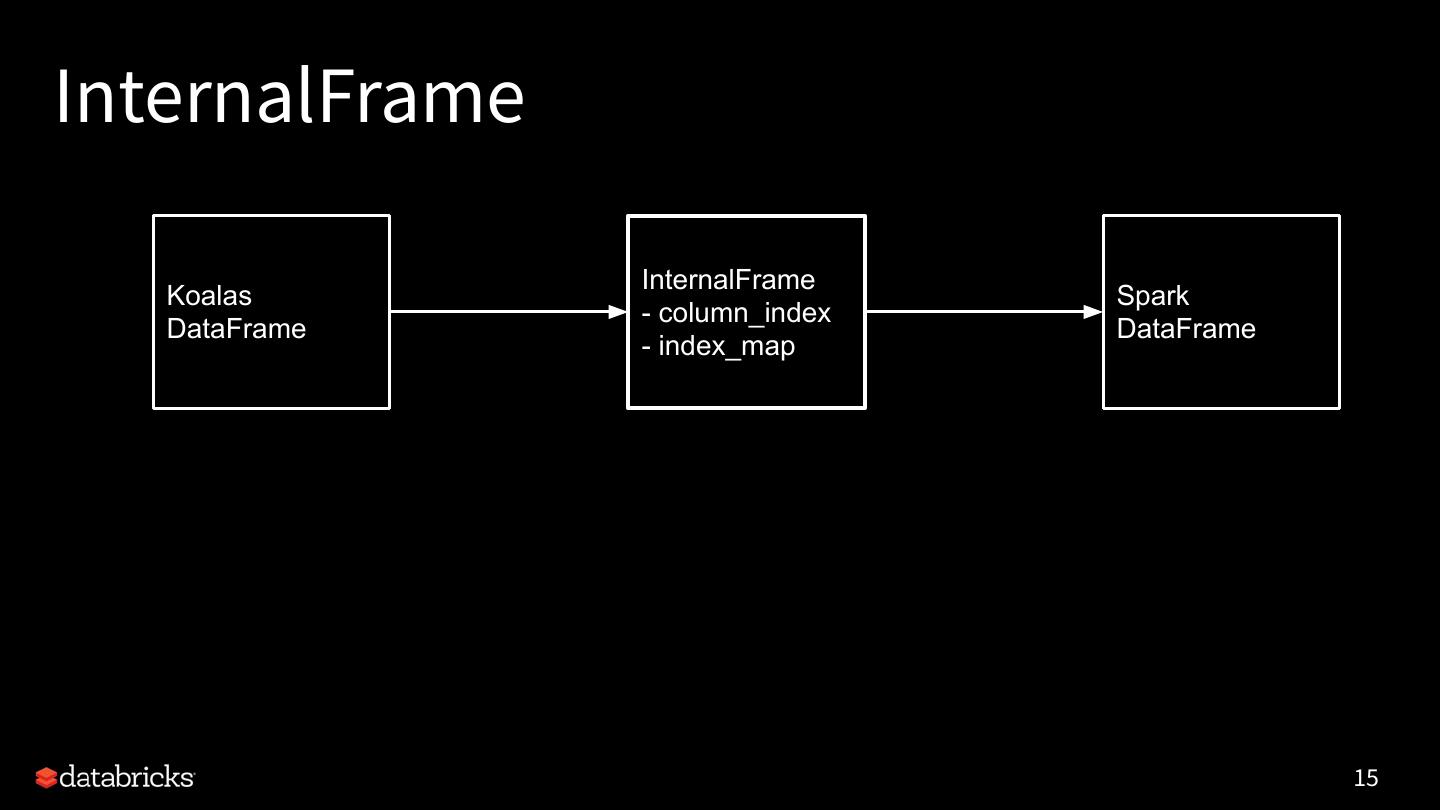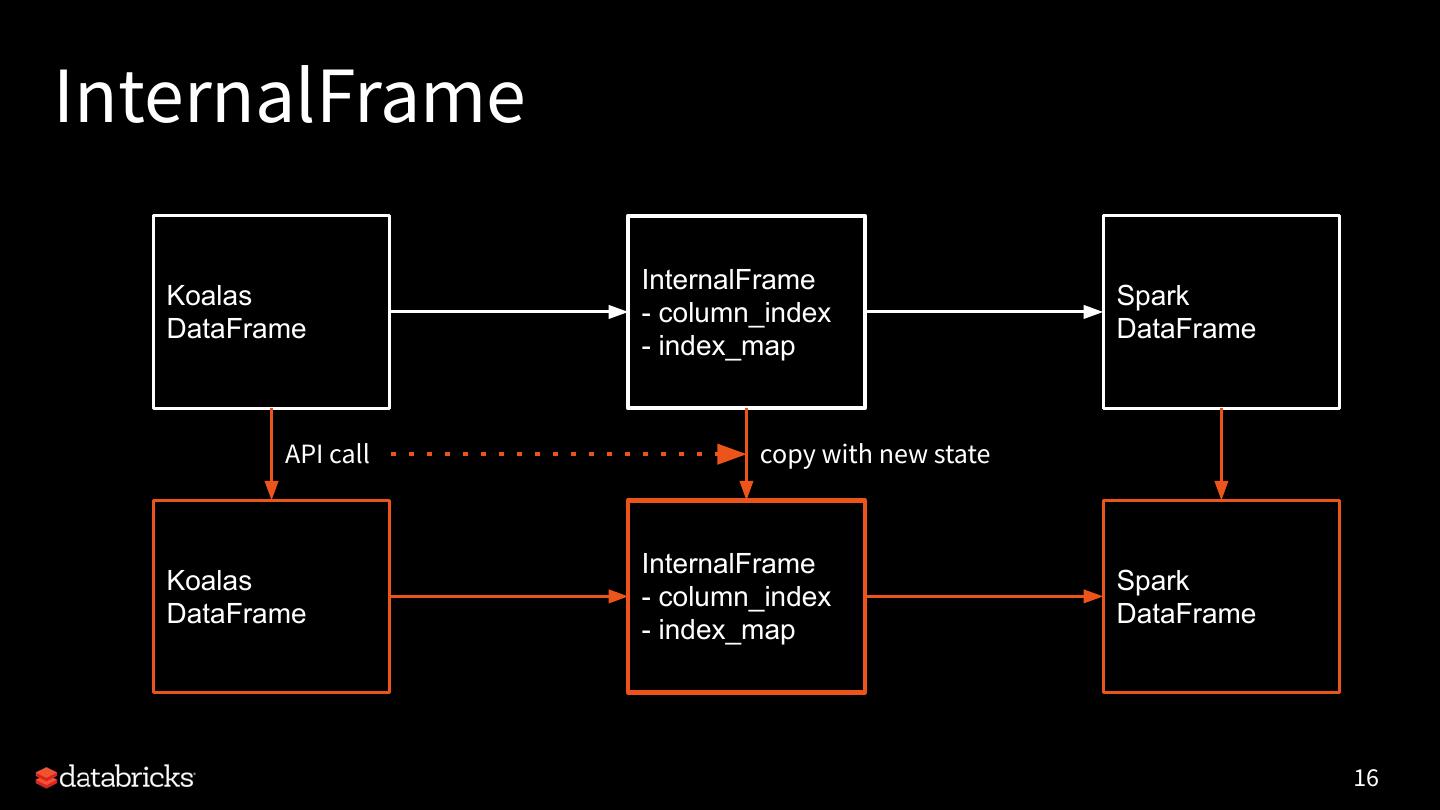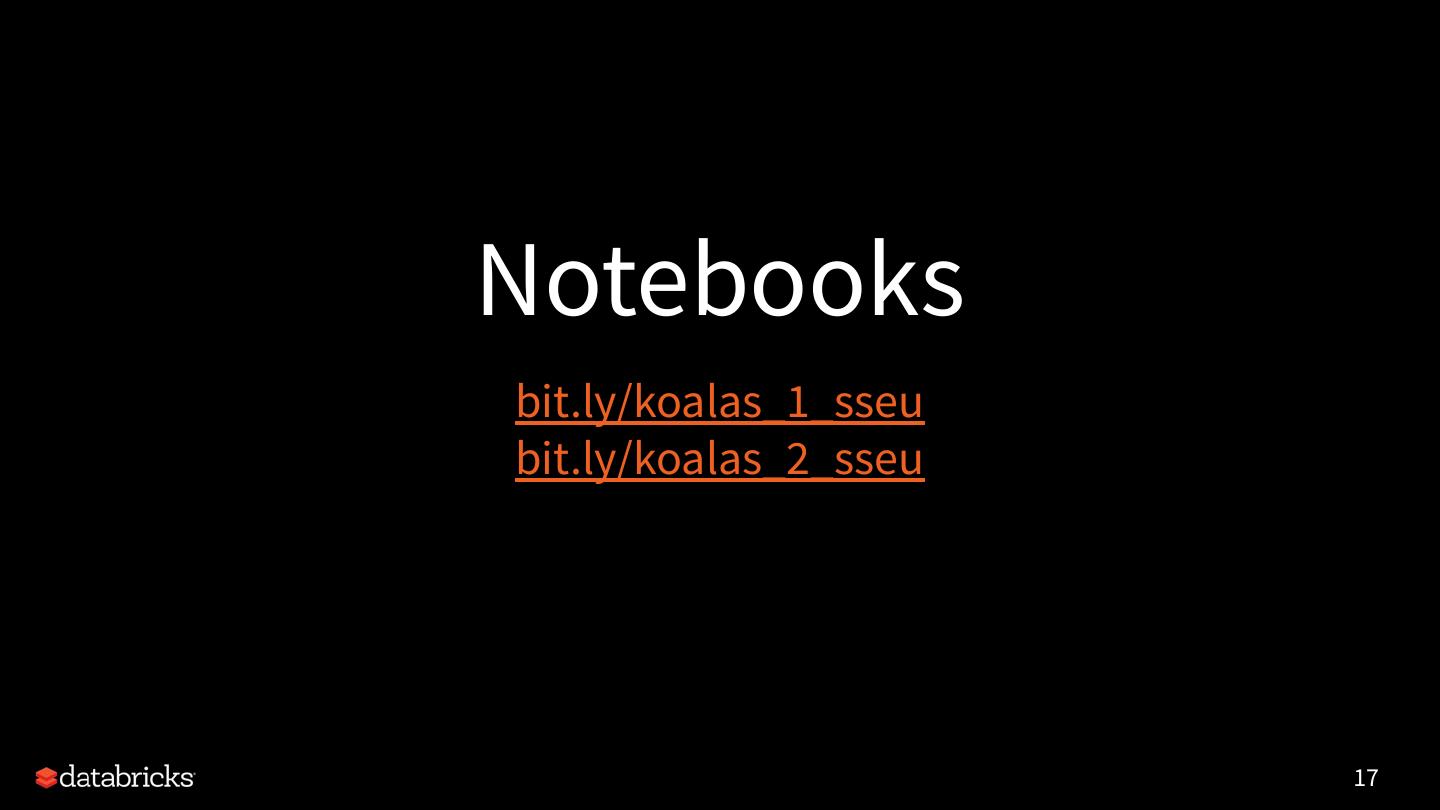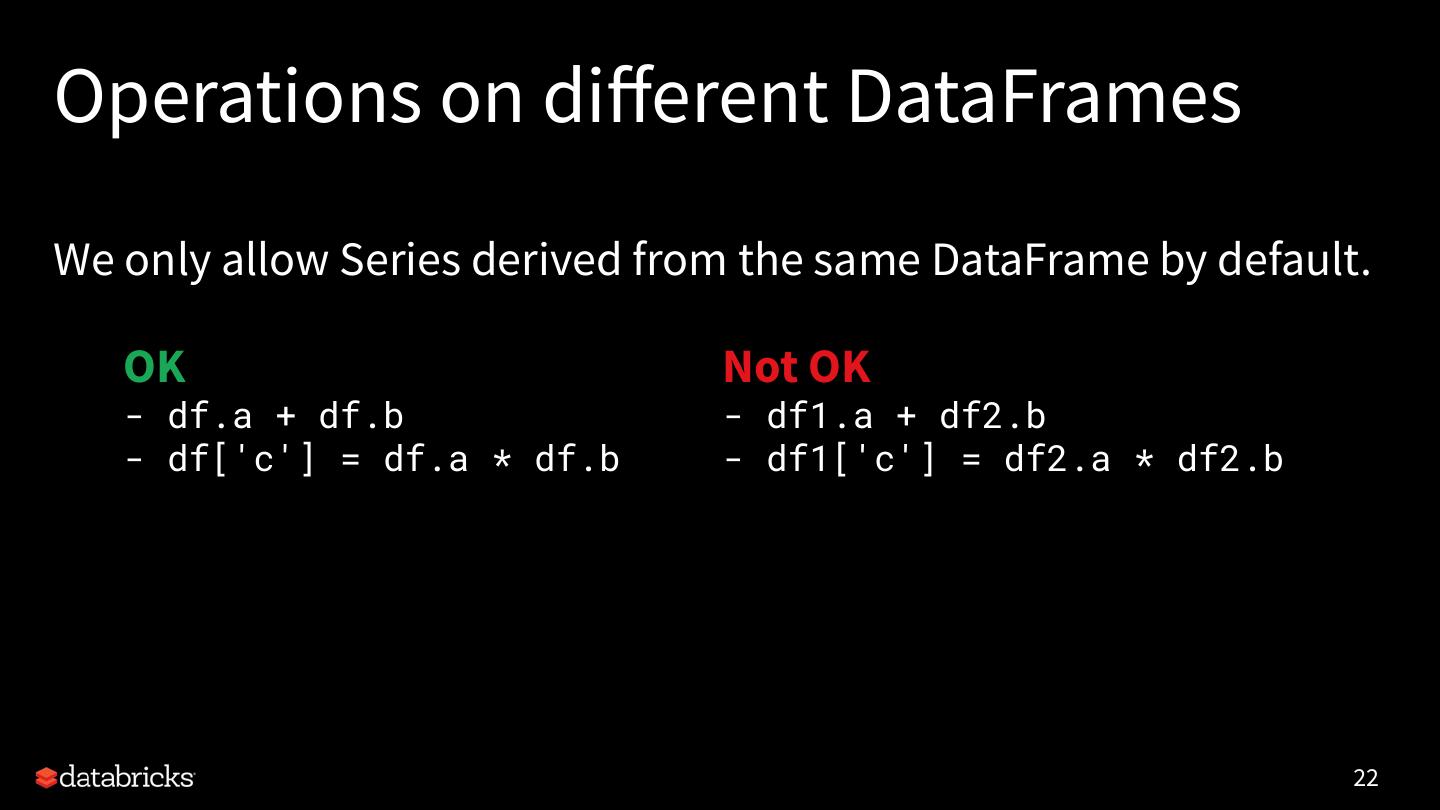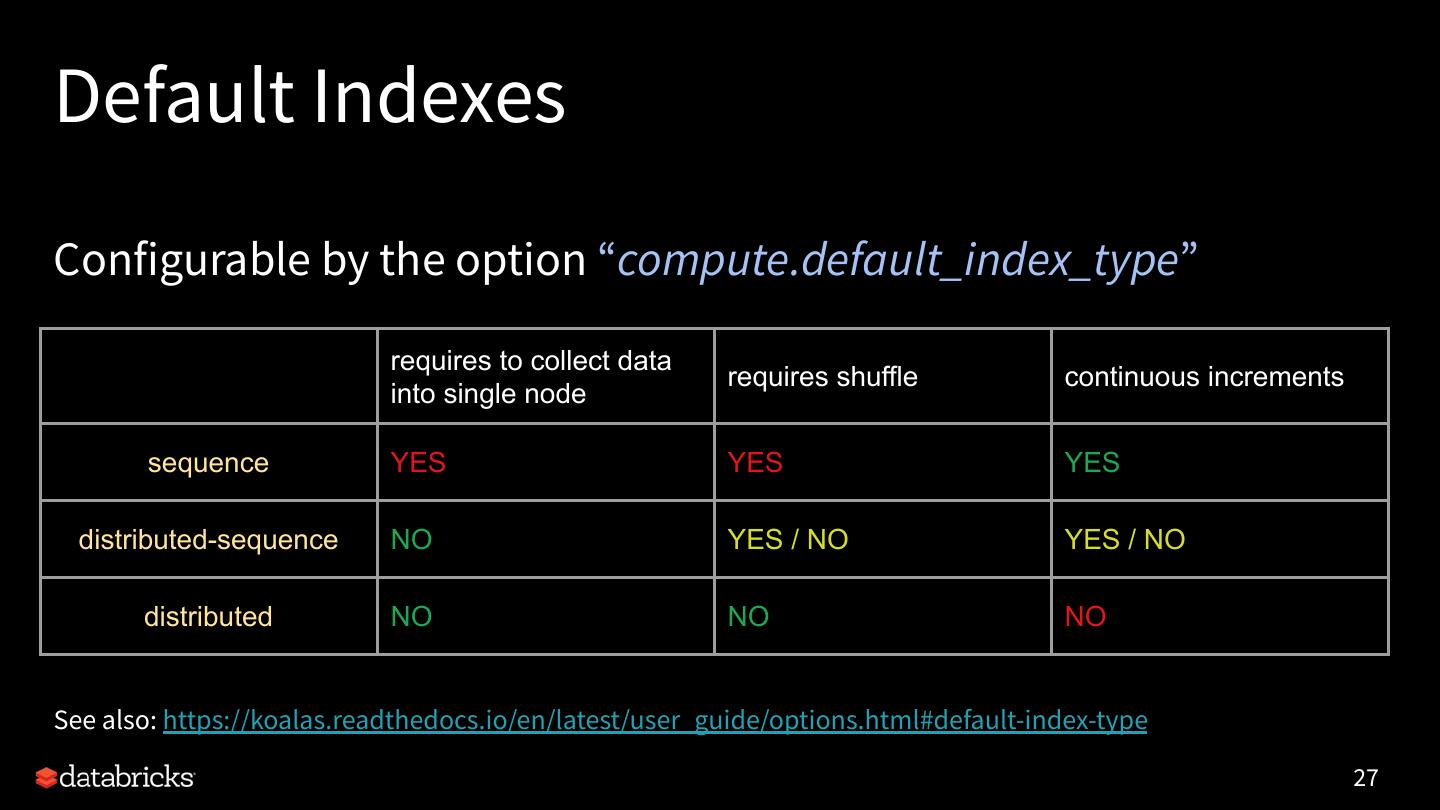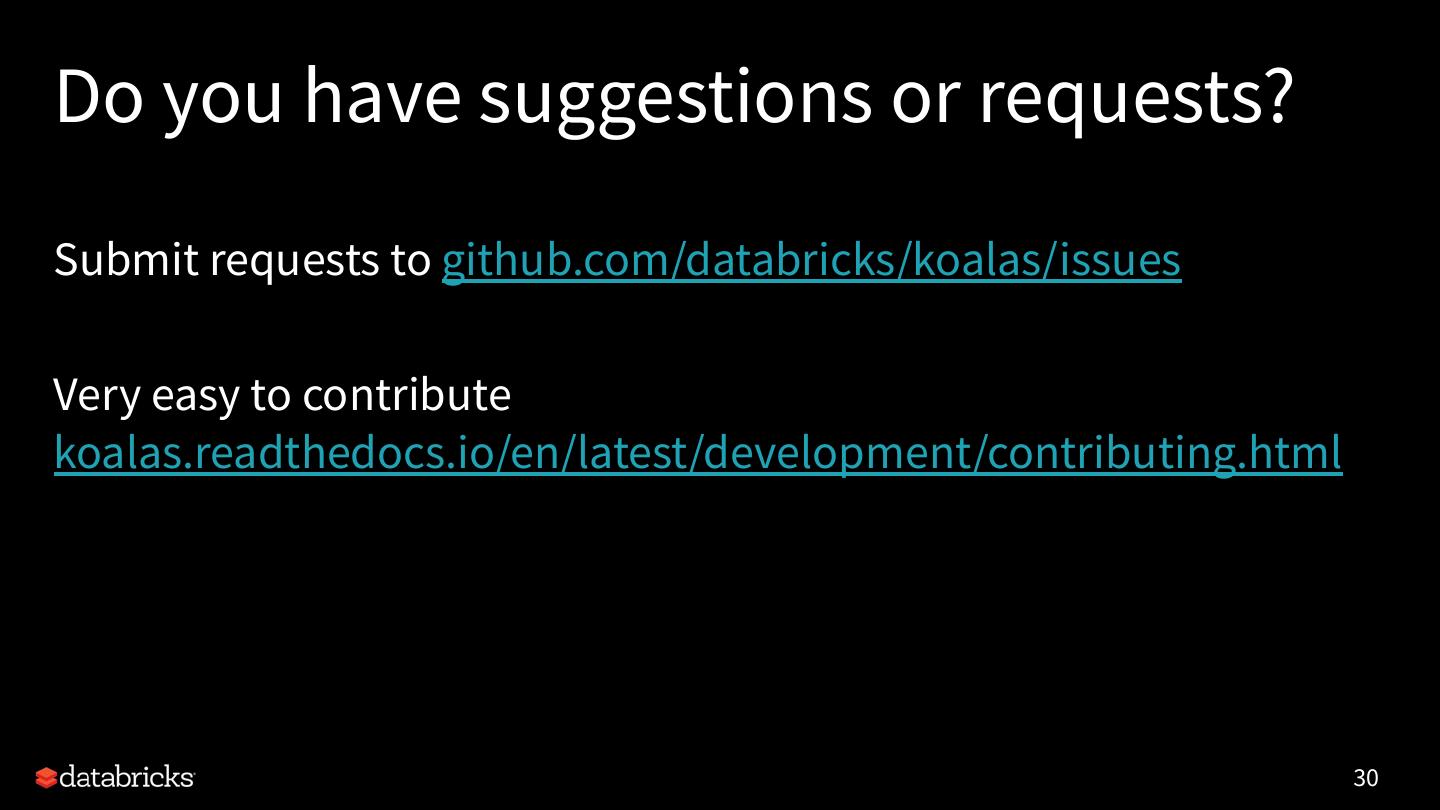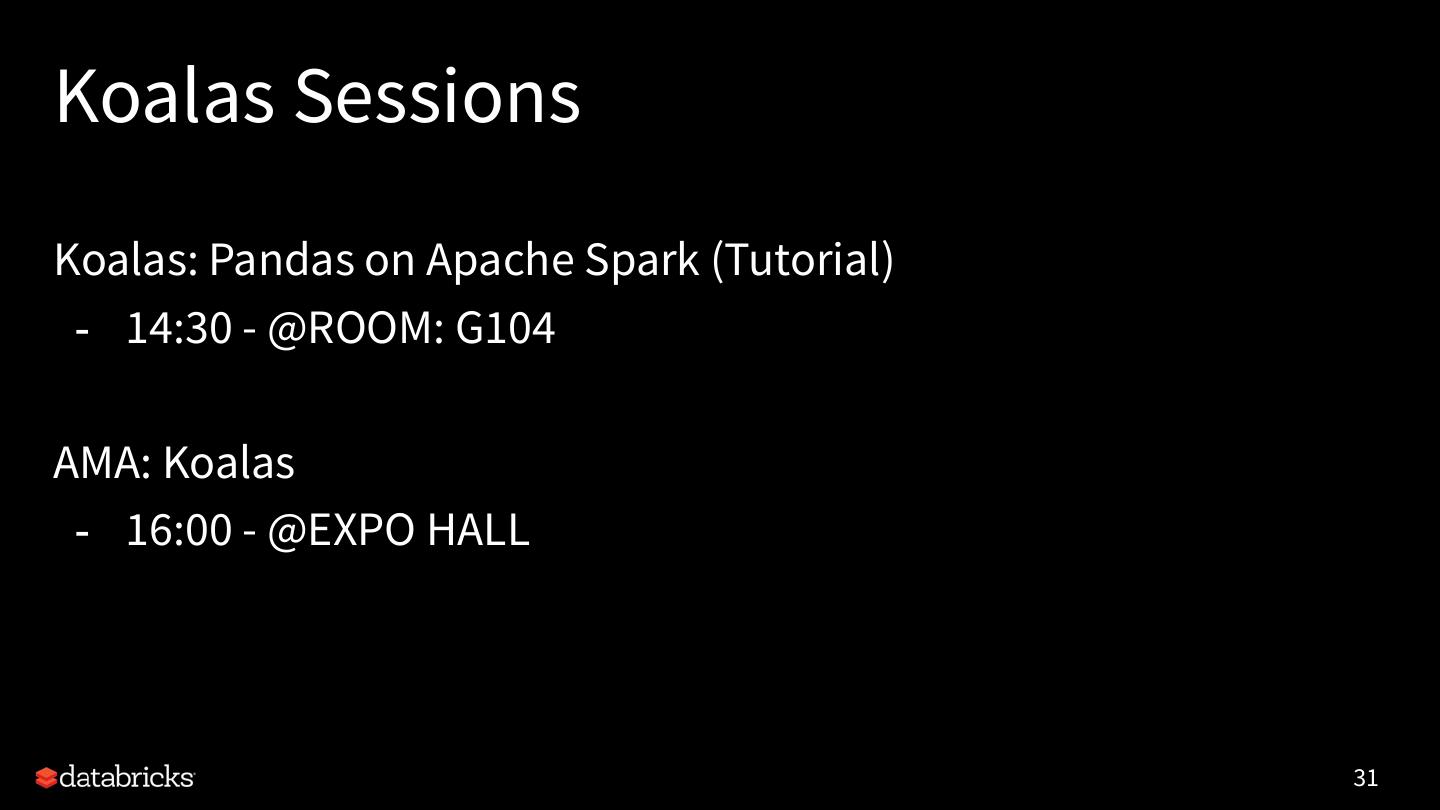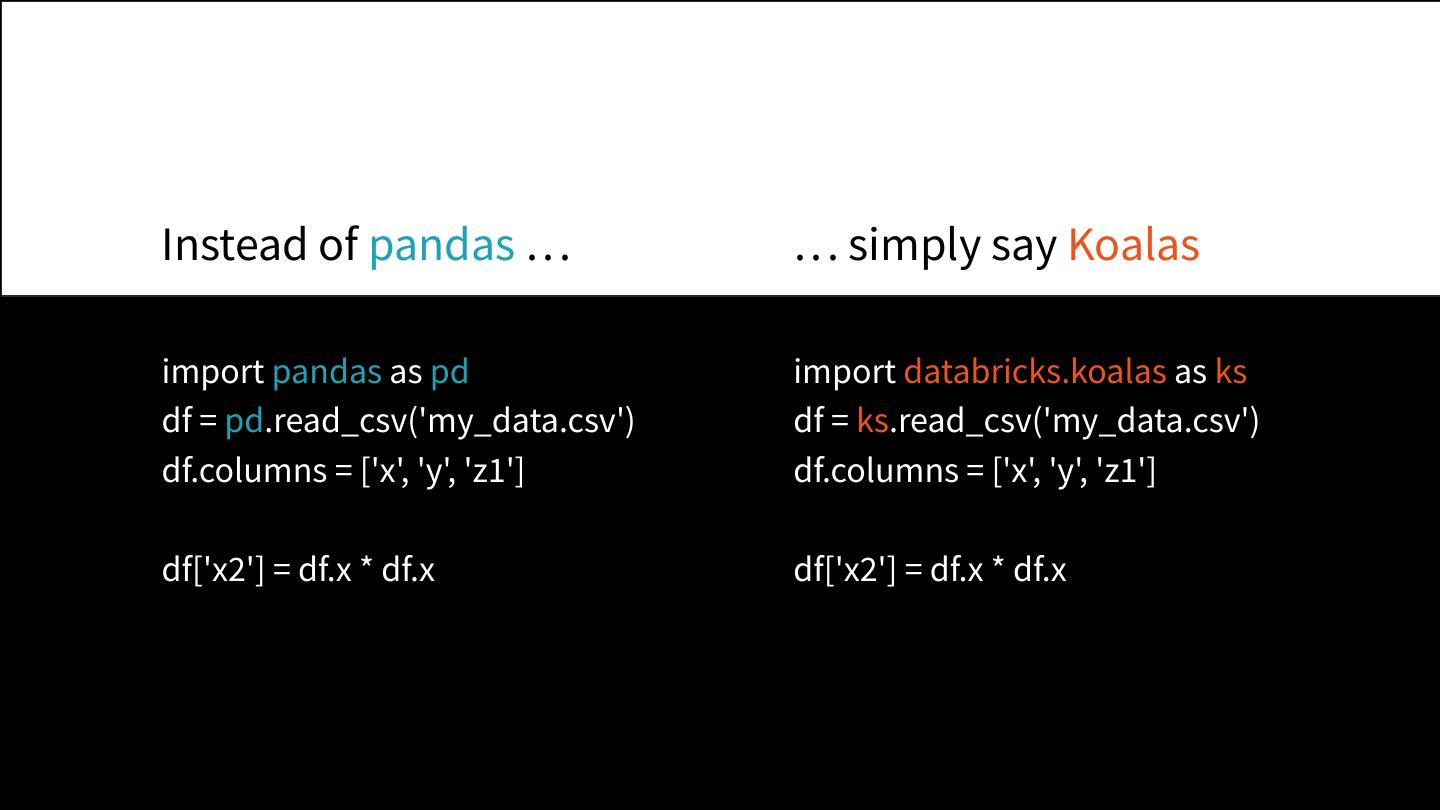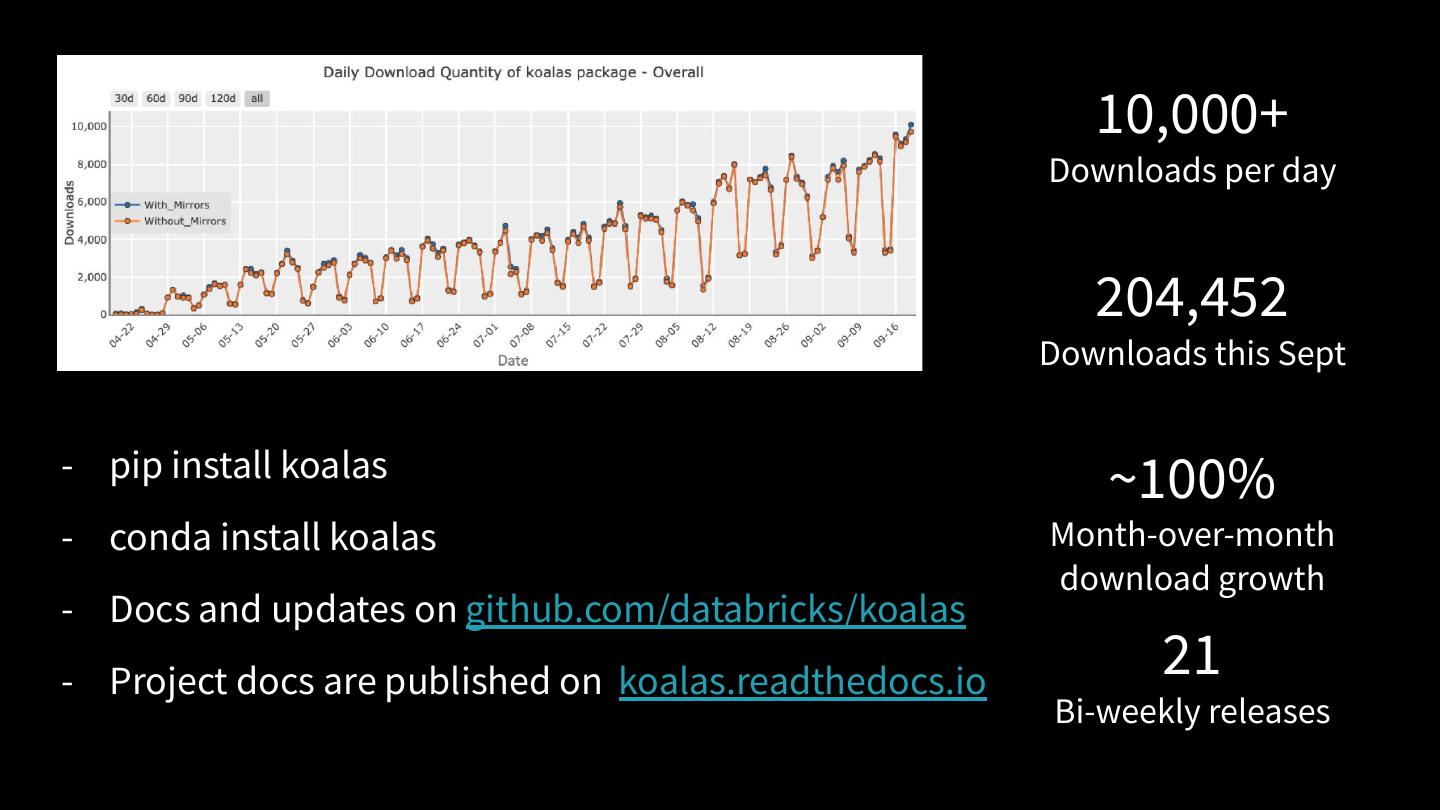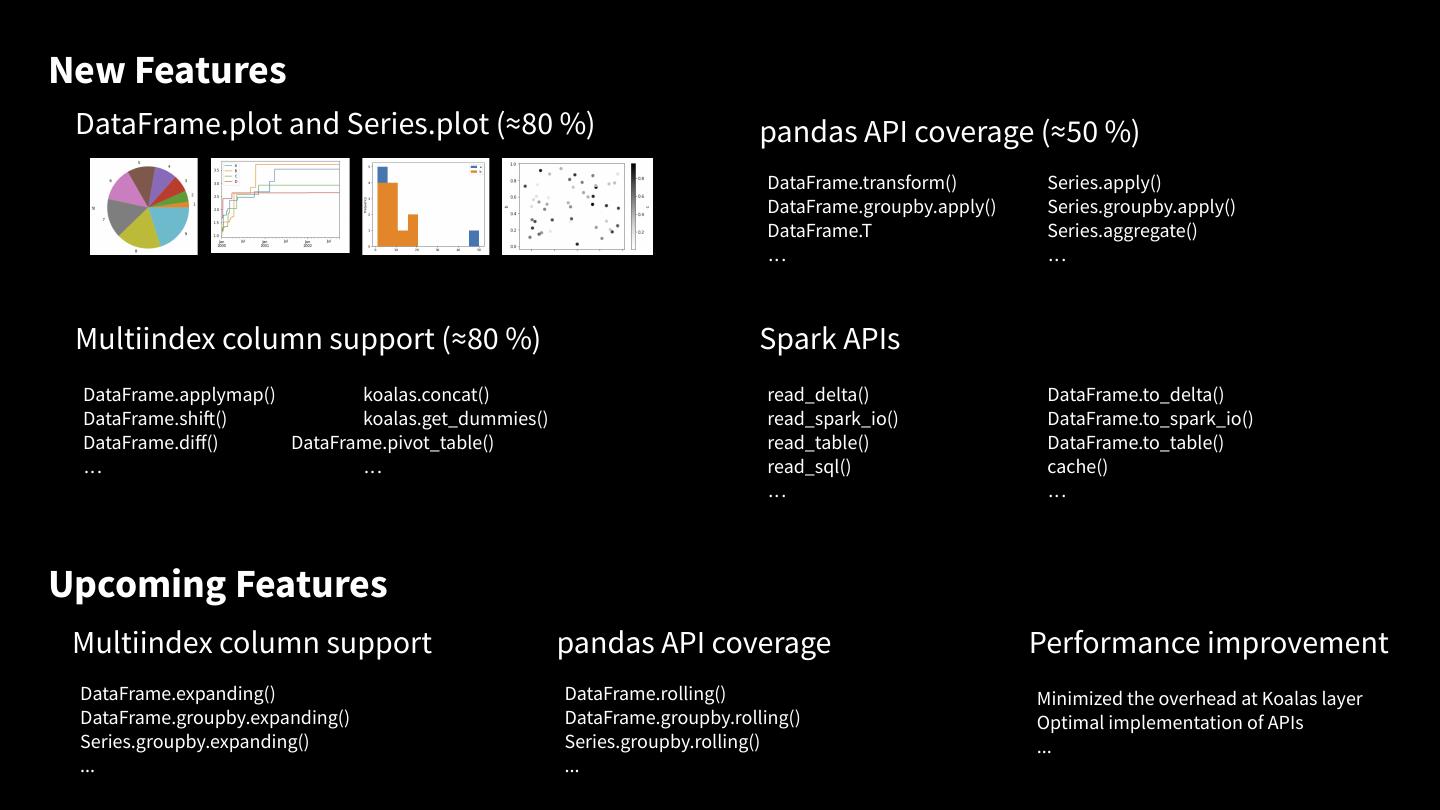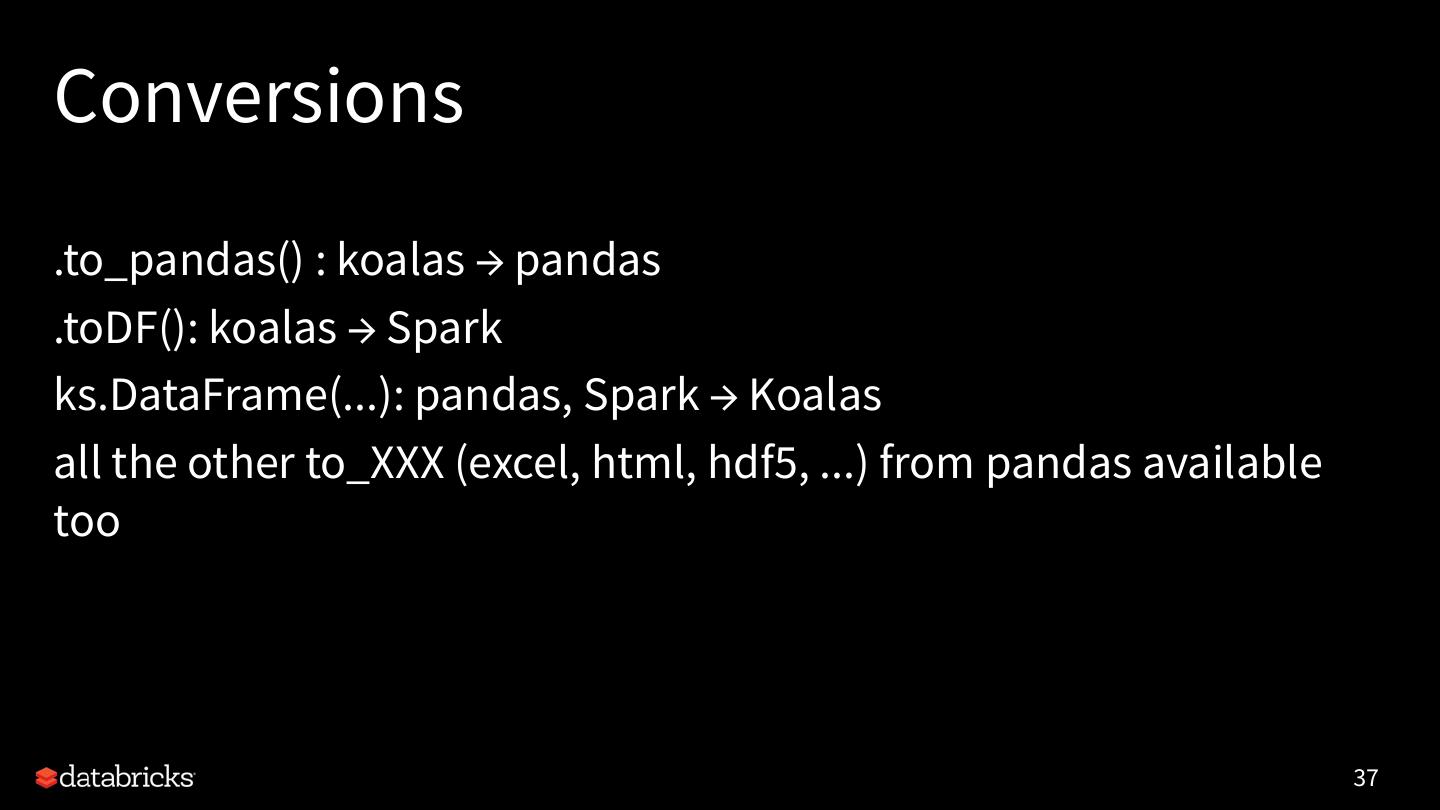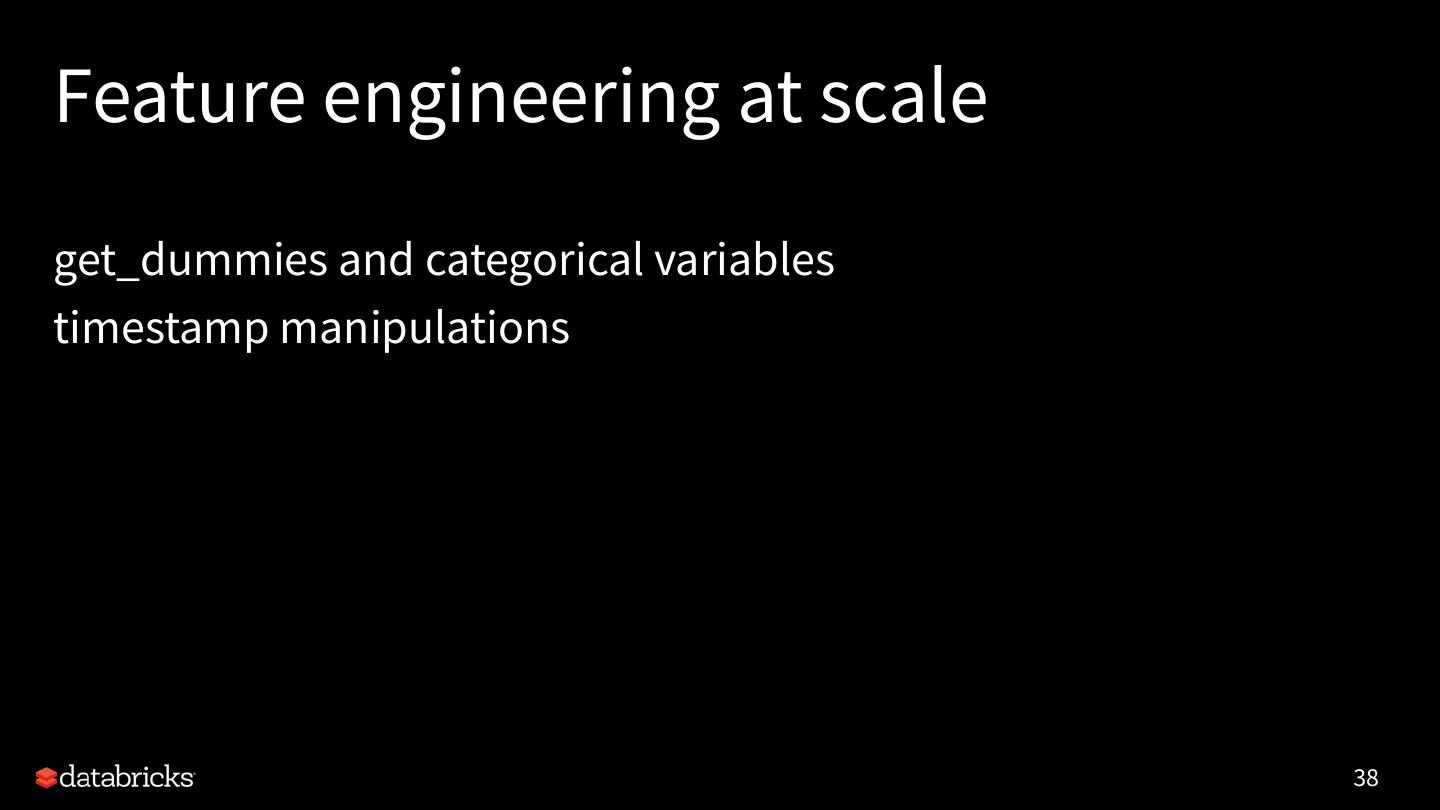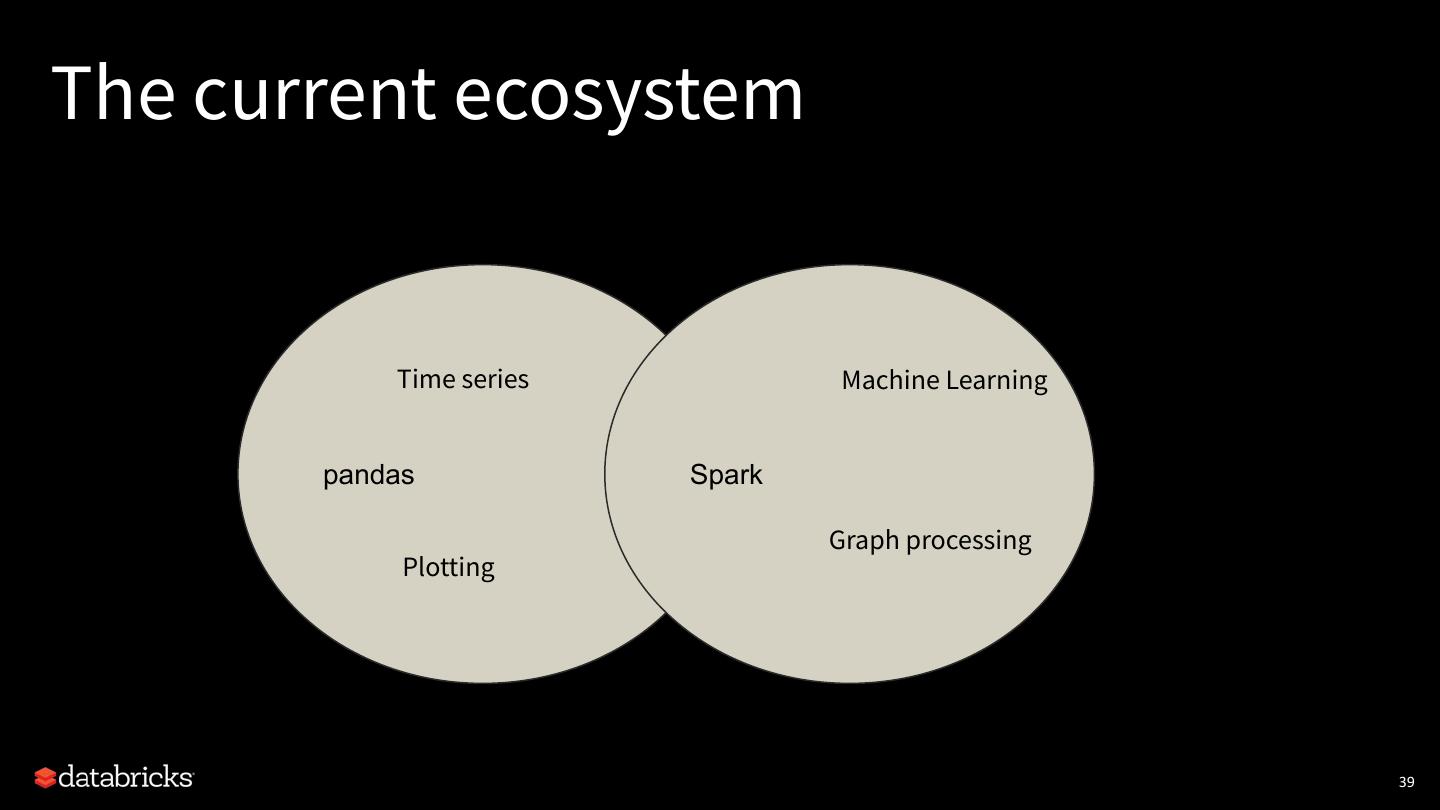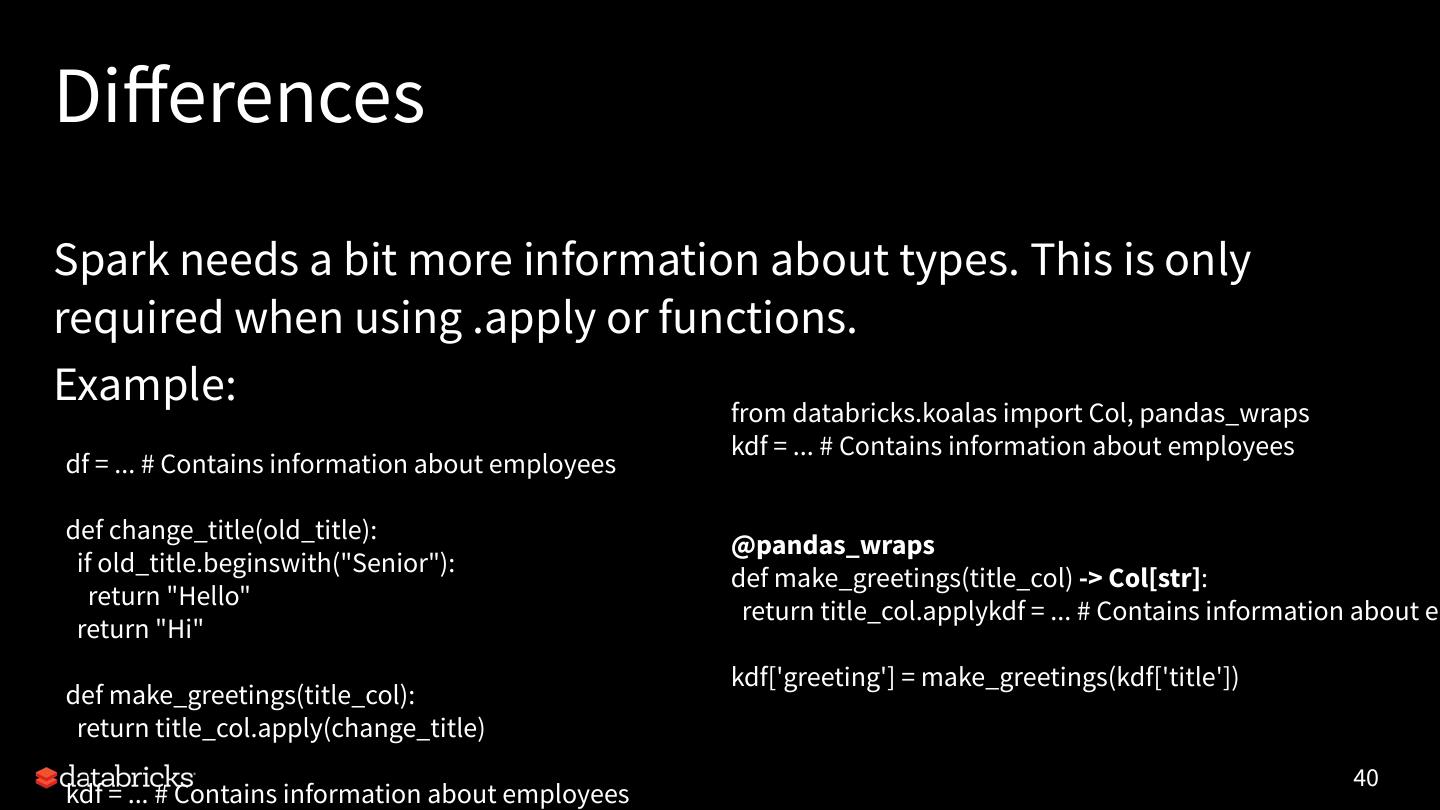- 快召唤伙伴们来围观吧
- 微博 QQ QQ空间 贴吧
- 视频嵌入链接 文档嵌入链接
- <iframe src="https://www.slidestalk.com/Spark/KoalasPandasonApacheSpark?embed&video" frame border="0" width="640" height="360" scrolling="no" allowfullscreen="true">复制
- 微信扫一扫分享
Koalas - Pandas on Apache Spark
In this tutorial we will present Koalas, a new open source project that we announced at the Spark + AI Summit in April. Koalas is an open-source Python package that implements the pandas API on top of Apache Spark, to make the pandas API scalable to big data. Using Koalas, data scientists can make the transition from a single machine to a distributed environment without needing to learn a new framework.
We will demonstrate Koalas’ new functionalities since its initial release, discuss its roadmaps, and how we think Koalas could become the standard API for large scale data science.
What you will learn:
How to get started with Koalas
Easy transition from Pandas to Koalas on Apache Spark
Similarities between Pandas and Koalas APIs for DataFrame transformation and feature engineering
Single machine Pandas vs distributed environment of Koalas
Prerequisites:
A fully-charged laptop (8-16GB memory) with Chrome or Firefox
Python 3 and pip pre-installed
pip install koalas from PyPI
Pre-register for Databricks Community Edition
Read koalas docs
展开查看详情
1 . Koalas tutorial Niall Turbitt Tim Hunter Brooke Wenig Spark + AI Summit Europe 2019 - Tutorials 1
2 .About Tim Hunter, Software Engineer at Databricks • Co-creator of the Koalas project • Contributes to Apache Spark MLlib, GraphFrames, TensorFrames and Deep Learning Pipelines libraries • Ph.D Machine Learning from Berkeley, M.S. Electrical Engineering from Stanford Niall Turbitt, Data Scientist at Databricks • Professional services and training • MSc Statistics University College Dublin, B.A Mathematics & Economics Trinity College Dublin
3 .Typical journey of a data scientist Education (MOOCs, books, universities) → pandas Analyze small data sets → pandas Analyze big data sets → DataFrame in Spark 3
4 .pandas Authored by Wes McKinney in 2008 The standard tool for data manipulation and analysis in Python Deeply integrated into Python data science ecosystem, e.g. numpy, matplotlib Can deal with a lot of different situations, including: - basic statistical analysis - handling missing data - time series, categorical variables, strings 4
5 .Apache Spark De facto unified analytics engine for large-scale data processing (Streaming, ETL, ML) Originally created at UC Berkeley by Databricks’ founders PySpark API for Python; also API support for Scala, R and SQL 5
6 .Koalas Announced April 24, 2019 Pure Python library Aims at providing the pandas API on top of Apache Spark: - unifies the two ecosystems with a familiar API - seamless transition between small and large data 6
7 .Quickly gaining traction Bi-weekly releases! > 500 patches merged since announcement > 20 significant contributors outside of Databricks > 8k daily downloads 7
8 .pandas DataFrame vs Spark DataFrame pandas DataFrame Spark DataFrame Column df['col'] df['col'] Mutability Mutable Immutable Add a column df['c'] = df['a'] + df['b'] df.withColumn('c', df['a'] + df['b']) Rename columns df.columns = ['a','b'] df.select(df['c1'].alias('a'), df['c2'].alias('b')) Value count df['col'].value_counts() df.groupBy(df['col']).count().order By('count', ascending = False) 8
9 . A short example import pandas as pd df = (spark.read df = pd.read_csv("my_data.csv") .option("inferSchema", "true") .option("comment", True) df.columns = ['x', 'y', 'z1'] .csv("my_data.csv")) df['x2'] = df.x * df.x df = df.toDF('x', 'y', 'z1') df = df.withColumn('x2', df.x*df.x) 9
10 .A short example import pandas as pd import databricks.koalas as ks df = pd.read_csv("my_data.csv") df = ks.read_csv("my_data.csv") df.columns = ['x', 'y', 'z1'] df.columns = ['x', 'y', 'z1'] df['x2'] = df.x * df.x df['x2'] = df.x * df.x 10
11 .Current status Bi-weekly releases, very active community with daily changes The most common functions have been implemented: - 60% of the DataFrame / Series API - 60% of the DataFrameGroupBy / SeriesGroupBy API - 15% of the Index / MultiIndex API - to_datetime, get_dummies, … 11
12 .New features - 80% of the plot functions (0.16.0-) - Spark related functions (0.8.0-) - IO: to_parquet/read_parquet, to_csv/read_csv, to_json/read_json, to_spark_io/read_spark_io, to_delta/read_delta, ... - SQL - cache - Support for multi-index columns (90%) (0.16.0-) - Options to configure Koalas’ behavior (0.17.0-) 12
13 .How Virgin Hyperloop One reduced processing time from hours to minutes with Koalas Challenge: increasing scale and complexity of data operations Struggling with the “Spark switch” from pandas More than 10X faster with less than 1% code changes
14 .Key Differences Spark is more lazy by nature: - most operations only happen when displaying or writing a DataFrame Spark does not maintain row order Performance when working at scale 14
15 .InternalFrame InternalFrame Koalas Spark - column_index DataFrame DataFrame - index_map 15
16 .InternalFrame InternalFrame Koalas Spark - column_index DataFrame DataFrame - index_map API call copy with new state InternalFrame Koalas Spark - column_index DataFrame DataFrame - index_map 16
17 .Notebooks bit.ly/koalas_1_sseu bit.ly/koalas_2_sseu 17
18 .Thank you! github.com/databricks/koalas Get Started at databricks.com/try 18
19 .Internal Frame Internal immutable metadata. - holds the current Spark DataFrame - manages mapping from Koalas column names to Spark column names - manages mapping from Koalas index names to Spark column names - converts between Spark DataFrame and pandas DataFrame 19
20 .InternalFrame InternalFrame Koalas Spark - column_index DataFrame DataFrame - index_map API call copy with new state InternalFrame Only updates metadata Koalas - column_index DataFrame - index_map kdf.set_index(...) 20
21 .InternalFrame InternalFrame Koalas Spark - column_index DataFrame DataFrame - index_map API call copy with new state e.g., inplace=True InternalFrame Spark - column_index DataFrame - index_map kdf.dropna(..., inplace=True) 21
22 .Operations on different DataFrames We only allow Series derived from the same DataFrame by default. OK Not OK - df.a + df.b - df1.a + df2.b - df['c'] = df.a * df.b - df1['c'] = df2.a * df2.b 22
23 .Operations on different DataFrames We only allow Series derived from the same DataFrame by default. OK Not OK - df.a + df.b - df1.a + df2.b - df['c'] = df.a * df.b - df1['c'] = df2.a * df2.b Equivalent Spark code? ??? sdf.select( sdf1.select( sdf['a'] + sdf['b']) sdf1['a'] + sdf2['b']) 23
24 .Operations on different DataFrames We only allow Series derived from the same DataFrame by default. OK Not OK - df.a + df.b - df1.a + df2.b - df['c'] = df.a * df.b - df1['c'] = df2.a * df2.b Equivalent Spark code? ??? sdf.select( sdf1.select( ce pt i o n!! n a ly s i sEx sdf['a'] + sdf['b']) A sdf1['a'] + sdf2['b']) 24
25 .Operations on different DataFrames ks.set_option('compute.ops_on_diff_frames', True) OK OK - df.a + df.b - df1.a + df2.b - df['c'] = df.a * df.b - df1['c'] = df2.a * df2.b Equivalent Spark code? sdf1.join(sdf2, sdf.select( on="_index_") sdf['a'] + sdf['b']) .select('a * b') 25
26 .Default Index Koalas manages a group of columns as index. The index behaves the same as pandas’. If no index is specified when creating a Koalas DataFrame: it attaches a “default index” automatically. Each “default index” has Pros and Cons. 26
27 .Default Indexes Configurable by the option “compute.default_index_type” requires to collect data requires shuffle continuous increments into single node sequence YES YES YES distributed-sequence NO YES / NO YES / NO distributed NO NO NO See also: https://koalas.readthedocs.io/en/latest/user_guide/options.html#default-index-type 27
28 .What to expect? • Improve pandas API coverage - rolling/expanding • Support categorical data types • More time-series related functions • Improve performance - Minimize the overhead at Koalas layer - Optimal implementation of APIs 28
29 .Getting started pip install koalas conda install koalas Look for docs on https://koalas.readthedocs.io/en/latest/ and updates on github.com/databricks/koalas 10 min tutorial in a Live Jupyter notebook is available from the docs. 29









